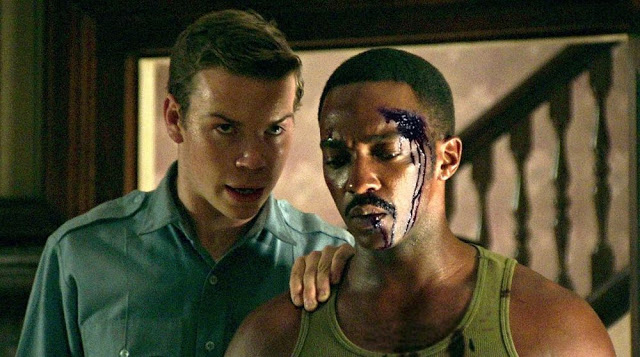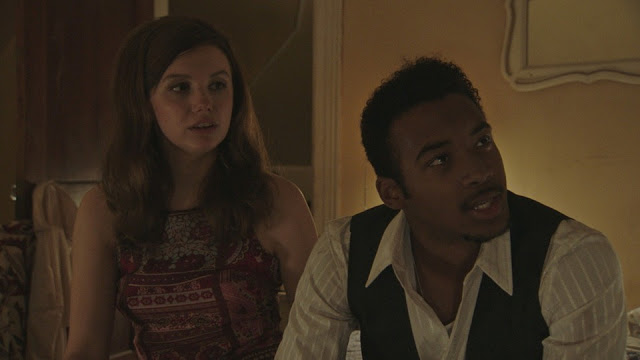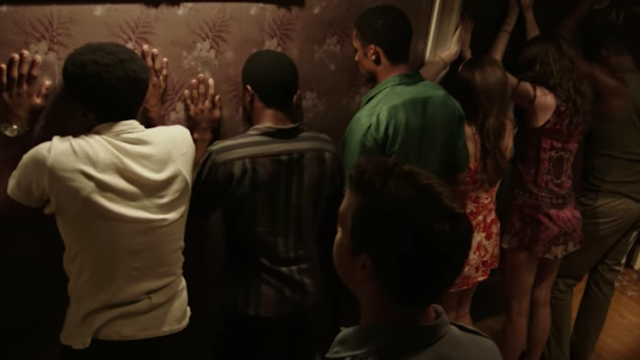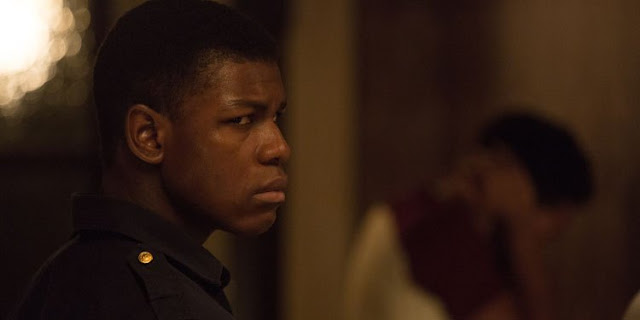Detroit opens with a police raid on an African-American nightclub, an edgy incursion that concludes with dozens of black patrons being forcibly loaded into paddy wagons. The movie, which takes place in 1967, was released in theaters on July 28, 2017. That same day, the President of the United States said this:
So, yes: In an era where virtually every American movie feels unnervingly topical—from franchise films to alien adventures to romantic comedies—Detroit resonates even more than most. Directed by Kathryn Bigelow, it rakes up considerable muck, tackling two intertwined issues—endemic racism and police brutality—with unapologetic frankness. This relevance almost automatically makes Detroit worth seeing; it’s rare for a film to firmly exist in both past and present at once. But if you can set aside its political significance (not that you should, of course), what emerges is a strange, decidedly uneven movie. Helmed by a filmmaker renowned for her precision, Detroit is oddly undisciplined, chaotic, even flabby. Yet it is also, at least during its extended central passage, a gripping, nightmarish tale of sweaty panic and helpless inevitability. It doesn’t always seem to know where it’s going, but it sure shakes you up in the process of getting there.
Following a rather startling prologue—in which Bigelow layers expository text about white flight and urban sprawl over crude crayon drawings—the movie begins with that aforementioned raid, which served as the spark that ignited the 12th Street Riots, a melee that raged for five days before it was quelled by the National Guard and the U.S. Airborne. Bigelow and screenwriter Mark Boal, who paired with the director on both The Hurt Locker and Zero Dark Thirty, strive to paint the city as a powder keg of rage and mistrust, but Detroit’s opening act feels curiously lethargic. The editing is haphazard, jumping from scene to scene and cutting across characters with little apparent purpose. (The leader of the raid, played by the excellent television actor Chris Chalk, is never seen again.) You could argue that Bigelow’s scattershot approach is designed to mirror the riots’ anarchic disarray, but it lacks focus, especially when she spends an eternity with a burgeoning group of Motown musicians preparing for a gig. Between its padded preamble and its needlessly prolonged postscript—a parade of informative but rote courtroom sequences that, weirdly, recalls the denouement of Baby Driver—Detroit could have easily trimmed 40 minutes off its runtime without sacrificing any of its primal intensity.
But between those sluggish bookends, Bigelow gets to work, delivering the genre goods while simultaneously underlining the film’s troubling themes. With a curfew in effect and the city around them bursting into flames, two of those black musicians, Larry (Algee Smith) and Fred (Jacob Latimore), take refuge at the Algiers Motel, where they put the moves on two white female tourists, Julie (Game of Thrones’ Hannah Murray) and Karen (Justified’s Kaitlyn Dever). It’s a sultry but pleasant evening, until one of the guests does something stupid—shots fired!—and three police officers crash through the motel’s gates, intent on demonstrating that white is might.
The bulk of Detroit recreates this single, hellish night at the Algiers, in which the officers—led by Krauss (Will Poulter, abandoning all pretense of comedy)—savagely interrogate the Algiers’ ten-or-so guests, demanding that they produce the gun that started this ruckus. (Also on scene is Dismukes—played by John Boyega, on loan from a galaxy far, far away—a black security guard who tries to assist the white officers while also attempting to slake their thirst for violence.) It’s a sequence that is both deeply disturbing—after being lined up against a wall, the guests are beaten, ridiculed, tortured, and in some cases killed—and, in cinematic terms, queasily exciting. With her characteristic rigor, Bigelow cultivates an air of suffocating suspense, as the officers grow increasingly impetuous and the “suspects” commensurately terrified. Her staging of the material isn’t quite as meticulous as in Zero Dark Thirty—the camera, operated by Hurt Locker cinematographer Barry Ackroyd, occasionally seems to wander into newfound rooms or discover unfamiliar characters, and the handheld approach engenders confusion as well as immediacy—but it’s vigorous, even seductive. You may be disgusted by what you see, but you are also desperate to see what happens next.
This is Bigelow’s gift: the ability to take loaded material and supply it with the electric charge of sensational entertainment. (Is it appropriate for a white director to dramatize such a racially fraught incident? That question lies outside my realm of putative expertise.) In a sense, Detroit feels like a distorted echo of Strange Days, Bigelow’s unsung 1995 masterpiece in which Ralph Fiennes unwittingly stumbled into a conspiracy involving two corrupt cops frantically covering their tracks. Yet in a different sense, it resembles a protracted take on the blackly comic scene in Schindler’s List involving a homicidal Nazi (Ralph Fiennes again!), a cluster of petrified Jews, and a stolen chicken. In fact, the acid resolution to that scene actually calls into question Detroit’s own internal logic; I have to admit that I spent much of the film staring into what appeared to be a giant plot hole.
But of course, the plot is only part of the story here. In reenacting past scenes of racially motivated police thuggery, Detroit seethes with present anger, making it more challenging than most pictures of its ilk. The typical historical drama is comforting as well as harrowing, showing us the ugliness of yesteryear as a way to reassure ourselves about our subsequent societal progress. To cite a recent example, Loving recalled the cruelty of anti-miscegenation laws with thoroughness, but it also reinforced their obsolescence. Back then, we as a nation were misguided; now, we know better.
Detroit lacks that sense of soothing distance. Quite the opposite—it insists that the problems it portrays remain, and it draws its comparisons with force. In particular, a scene where an officer guns down a defenseless suspect, then swiftly plants a knife by his body, evokes visions of Michael Slager and Walter Scott. Watching this film makes you wonder if, fifty years from now, an intrepid action director might make a movie called Ferguson, and whether it will serve as yet another mirror for a country that remains plagued by discrimination and state-perpetrated violence.
In Detroit’s most effective pre-motel scene, a detective questions an officer about his prior shooting of an unarmed looter who was fleeing down the street. “Why’d you shoot him in the back?” the detective asks. The officer is puzzled. “He was running away from me,” he responds. “How else was I supposed to shoot him?” It may be clumsy, but in moments like that, Detroit feels less like a period piece recreating events a half-century old than like a disquieting glimpse into the world we know—and fear—today.
Jeremy Beck is the editor-in-chief of MovieManifesto. He watches more movies and television than he probably should.




